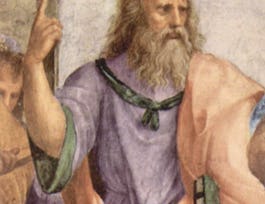This course will introduce you to some of the main areas of research in contemporary philosophy. Each module a different philosopher will talk you through some of the most important questions and issues in their area of expertise. We’ll begin by trying to understand what philosophy is – what are its characteristic aims and methods, and how does it differ from other subjects? Then we’ll spend the rest of the course gaining an introductory overview of several different areas of philosophy.


Introduction to Philosophy
Taught in English
Some content may not be translated
664,050 already enrolled
(9,111 reviews)
Details to know

Add to your LinkedIn profile
18 quizzes
See how employees at top companies are mastering in-demand skills


Earn a career certificate
Add this credential to your LinkedIn profile, resume, or CV
Share it on social media and in your performance review

There are 14 modules in this course
(Dr. Dave Ward) We’ll start the course by thinking about what Philosophy actually is: what makes it different from other subjects? What are its distinctive aims and methods? We'll also think about why the questions that philosophers attempt to answer are often thought to be both fundamental and important, and have a look at how philosophy is actually practiced. Finally, we'll briefly touch upon two very influential philosophers' answers to the question of how we can know whether, in any given case, there really is a right way of thinking about things.
What's included
4 videos3 readings2 quizzes
(Dr. Matthew Chrisman) We all live with some sense of what is good or bad, some feelings about which ways of conducting ourselves are better or worse. But what is the status of these moral beliefs, senses, or feelings? Should we think of them as reflecting hard, objective facts about our world, of the sort that scientists could uncover and study? Or should we think of moral judgements as mere expressions of personal or cultural preferences? In this module we’ll survey some of the different options that are available when we’re thinking about these issues, and the problems and prospects for each.
What's included
4 videos2 readings1 quiz
(Professor Duncan Pritchard) We know a lot of things – or, at least, we think we do. Epistemology is the branch of philosophy that studies knowledge; what it is, and the ways we can come to have it. In this module, we’ll take a tour through some of the issues that arise in this branch of philosophy. In particular, we’ll think about what radical scepticism means for our claims to knowledge. How can we know something is the case if we’re unable to rule out possibilities that are clearly incompatible with it?
What's included
5 videos2 readings1 quiz
What's included
2 quizzes
(Dr. Guy Fletcher) The laws of a state govern what we can and cannot do within that state. But do we have an obligation to obey those laws? In this module, we'll discuss this question, together with some of the main positions that philosophers have developed in response to it. We'll start off by examining what obeying the law means exactly. Then we'll look at three factors that might form the basis of an obligation to follow the law. Finally, we'll discuss what the consequences might be if the problem can't be solved.
What's included
7 videos2 readings1 quiz
(Dr. Allan Hazlett) Much of what we think about the world we believe on the basis of what other people say. But is this trust in other people's testimony justified? In this module, we’ll investigate how this question was addressed by two great philosophers of the Scottish Enlightenment, David Hume (1711 - 1776) and Thomas Reid (1710 - 1796). Hume and Reid's dispute about testimony represents a clash between two worldviews that would continue to clash for centuries: a skeptical and often secular worldview, eager to question everything (represented by Hume), and a conservative and often religious worldview, keen to defend common sense (represented by Reid).
What's included
5 videos2 readings1 quiz
What's included
2 quizzes
(Dr. Suilin Lavelle) If you’re reading this, then you’ve got a mind. But what is a mind, and what does it take to have one? Should we understand minds as sets of dispositions to behave in certain ways, as patterns of neural activation, or as akin to programmes that are run on the computational hardware of our brains? In this module, we’ll look at how and why recent philosophy of mind and psychology has embraced each of these options in turn, and think about the problems and prospects for each.
What's included
7 videos2 readings1 quiz
(Professor Michela Massimi) In this module we will explore a central and ongoing debate in contemporary philosophy of science: whether or not scientific theories are true. Or better, whether a scientific theory needs to be 'true' to be good at all. The answer to this question comes in two main varieties. Scientific realists believe that theories ought to be true in order to be good. We will analyse their main argument for this claim (which goes under the name of 'no miracles argument'), and some prominent objections to it. Scientific antirealists, on the other hand, defend the view that there is nothing special about 'truth' and that scientific theories and scientific progress can be understood without appeal to it. The aim of this session is to present both views, their main arguments, and prospects.
What's included
7 videos2 readings1 quiz
What's included
2 quizzes
(Dr. Elinor Mason) We typically feel that the actions that we make are the result of our own free choices. But what if those actions are simply the end result of a long chain of cause and effect? What does this mean for free will? In this module, we'll look at the concept of determinism. In particular, we'll consider the implications that determinism might have for the notion of free will.
What's included
5 videos2 readings1 quiz
(Dr. Alasdair Richmond) In this module we'll think about some issues in metaphysics, a branch of philosophy that investigates the ways that reality could intelligibly be. Our case study will be the possibility, or otherwise, of time-travel. Some have thought that the apparent possibility of creating a machine that we could use to transport a person backwards in time can be ruled out just by thinking about it. But is time-travel really logically impossible? What would the universe have to be like for it to be possible? And can we know whether our universe fits the bill?
What's included
6 videos2 readings1 quiz
What's included
2 quizzes
What's included
1 peer review
Instructors



Offered by
Recommended if you're interested in Philosophy

University of Pennsylvania

Wesleyan University

University of Pennsylvania

University of Pennsylvania
Why people choose Coursera for their career




Learner reviews
Showing 3 of 9111
9,111 reviews
- 5 stars
75.57%
- 4 stars
19.66%
- 3 stars
3.42%
- 2 stars
0.64%
- 1 star
0.69%

Open new doors with Coursera Plus
Unlimited access to 7,000+ world-class courses, hands-on projects, and job-ready certificate programs - all included in your subscription
Advance your career with an online degree
Earn a degree from world-class universities - 100% online
Join over 3,400 global companies that choose Coursera for Business
Upskill your employees to excel in the digital economy
Frequently asked questions
Access to lectures and assignments depends on your type of enrollment. If you take a course in audit mode, you will be able to see most course materials for free. To access graded assignments and to earn a Certificate, you will need to purchase the Certificate experience, during or after your audit. If you don't see the audit option:
The course may not offer an audit option. You can try a Free Trial instead, or apply for Financial Aid.
The course may offer 'Full Course, No Certificate' instead. This option lets you see all course materials, submit required assessments, and get a final grade. This also means that you will not be able to purchase a Certificate experience.
When you purchase a Certificate you get access to all course materials, including graded assignments. Upon completing the course, your electronic Certificate will be added to your Accomplishments page - from there, you can print your Certificate or add it to your LinkedIn profile. If you only want to read and view the course content, you can audit the course for free.
You will be eligible for a full refund until two weeks after your payment date, or (for courses that have just launched) until two weeks after the first session of the course begins, whichever is later. You cannot receive a refund once you’ve earned a Course Certificate, even if you complete the course within the two-week refund period. See our full refund policy.








